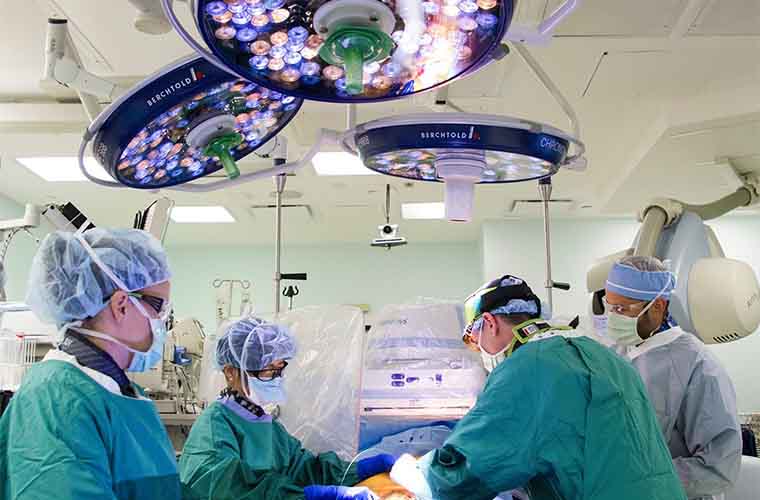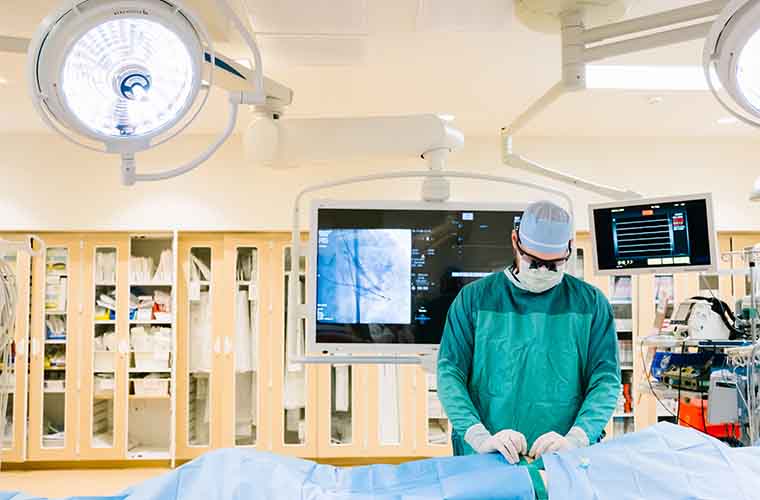BayCare Receives Recognition for its Minimally Invasive Transcatheter Valve Procedures

The structural heart programs at BayCare’s Morton Plant Hospital in Clearwater and St. Joseph’s Hospital in Tampa recently received the American College of Cardiology (ACC) Transcatheter Valve Certification.
The certification recognizes each program’s expertise and commitment to excellence in treating patients receiving transcatheter valve repair and replacement procedures.
“Our team at Morton Plant Hospital is proud to receive this prestigious certification from the ACC,” said Joshua Rovin, MD, FACS, cardiovascular surgeon and medical director, for the Center for Advanced Valve and Structural Heart Care at Morton Plant Hospital. “It recognizes our commitment to continually improving our knowledge and skills to ensure each patient who comes to us with aortic stenosis has the best hope for a successful outcome.”
Aortic stenosis is a disease that affects the aortic valve. In late stages of the disease, the valve does not open and close properly. This causes the heart to work harder to push blood through the calcified aortic valve. Eventually the heart’s muscles weaken, increasing the patient’s risk of heart failure.
Before Transcatheter Aortic Valve Replacement (TAVR), the primary solution for patients suffering from aortic stenosis was open heart surgery, which was not an option for many people. The introduction of TAVR, a minimally invasive alternative, has helped thousands of patients suffering from severe aortic stenosis regain the quality of life that once seemed impossible.

“Receiving the ACC’s TAVR Certification is a testament to the highly skilled team at St. Joseph’s Hospital’s Structural Heart and Valve Program,” said Phillips Harrington, MD, cardiothoracic surgeon, and director of the St. Joseph’s Hospital Structural Heart program. “We continually pursue excellent outcomes, so we can provide the best possible care for each patient we treat.”
In addition to the two hospitals, BayCare also has a structural heart program at the Bostick Heart Center at Winter Haven Hospital which started in 2020. The team approach employed and the collaboration between those teams make BayCare’s structural heart programs stand out in the region. A cardiologist, a heart surgeon and one or two nurse practitioners work together to assess each patient. The surgeons and cardiologists then meet weekly to discuss each case and decide the best option for the patient. The medical professionals at all sites regularly collaborate to ensure patients throughout the region receive outstanding care closest to their home.
“As part of BayCare, we collaborated with doctors who had been doing TAVR procedures for many years at Morton Plant and St. Joseph’s. They invested their time and energy in our program to ensure we met our health system’s high standards,” said David Dodd, MD, cardiothoracic surgeon and medical director of structural heart program at the Bostick Heart Center. “Our patients have benefitted from the evidence-based approaches employed by the BayCare structural heart teams.”
The ACC’s Transcatheter Valve Certification is an external review and certification process that pairs with established national clinical databases to monitor patient safety and real-world outcomes. Participation in established national clinical databases is required for hospitals interested in achieving Transcatheter Valve Certification.
The certification uses established national clinical measures to support clinical decisions and links process improvement to patient outcomes. Hospitals that achieve the certification learn best practices for implementing evidence-based medicine to support patient-centered decision-making and can track key performance metrics to better identify opportunities for improvement.
For more information on BayCare’s TAVR services, visit our website.
